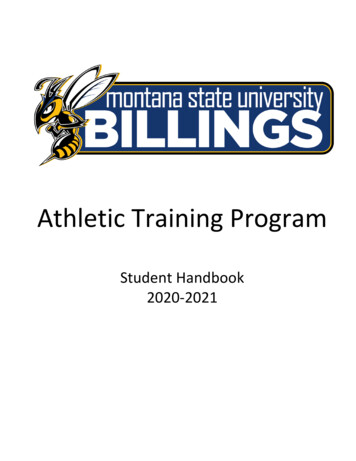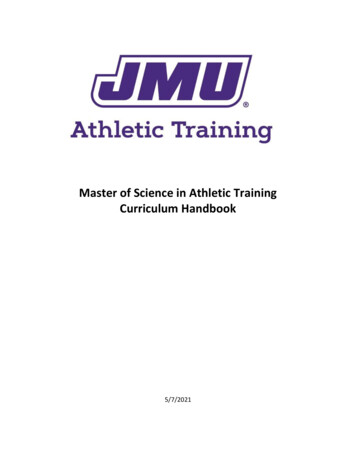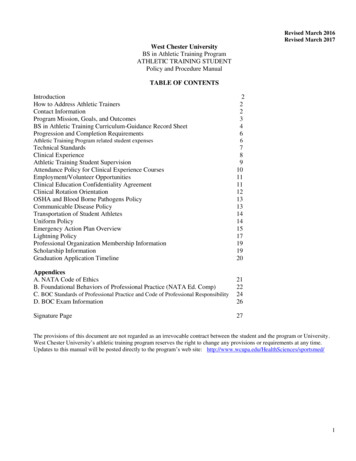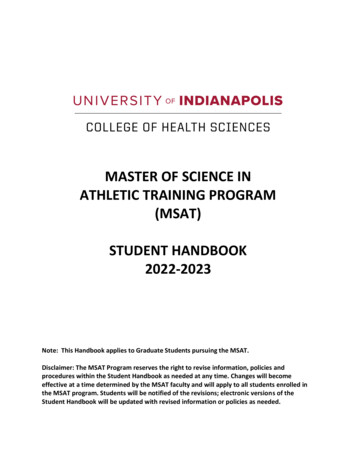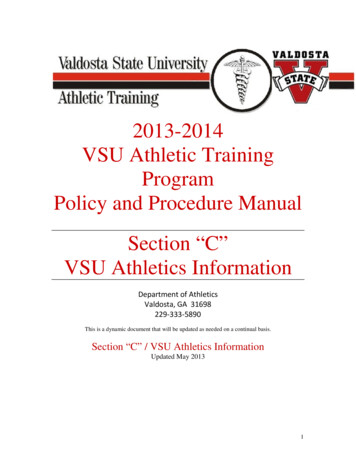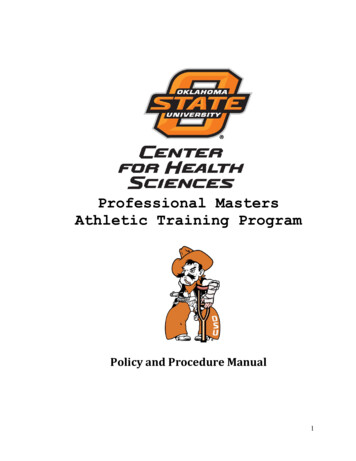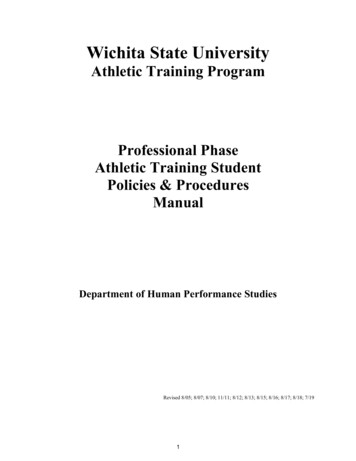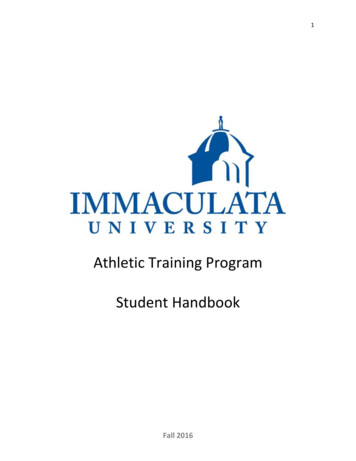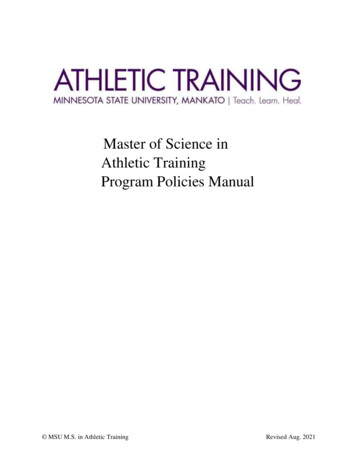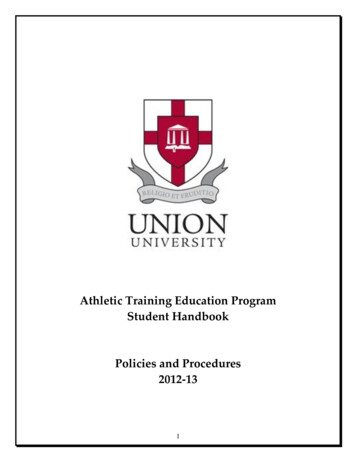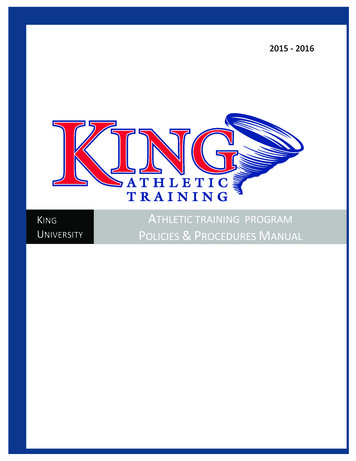
Transcription
2015 - 2016KINGUNIVERSITYATHLETIC TRAINING PROGRAMPOLICIES & PROCEDURES MANUAL
Dear Athletic Training Student:Congratulations on your acceptance into the King University Athletic Training Program! Our faculty andstaff are delighted to have you as a part of our growing program and we look forward to helping yougrow intellectually, personally and spiritually over the next three years. Our goal is to provide each ofyou with a personalized, comprehensive learning experience that will give you the knowledge necessaryto become a part of the allied health care profession of Athletic Training.The King University Athletic Training faculty and staff are committed to providing students with the besteducational experience possible. Class sizes are small and provide close supervision and interaction withexperienced professionals. We do this by offering courses that challenge students in both the classroomand in clinical settings. Each student will complete a rigorous curriculum of Athletic Training courses,and will also experience Athletic Training first hand in clinical educational experiences.The King University Athletic Training Program is currently fully accredited by the Commission onAccreditation of Athletic Training Education (CAATE). Students wishing to become a Certified AthleticTrainer (ATC) must graduate from a CAATE-accredited program to be eligible to sit for the Board ofCertification, Inc. (BOC) examination. Students who pass the BOC examination have a wide variety ofoptions they can pursue after graduation.Again, congratulations on your acceptance into the King University Athletic Training Program! We lookforward to working with you to help you achieve your goals!Sincerely,The Athletic Training Faculty and StaffHeather Hess, MA, ATC, LAT – Program Coordinator/DirectorScott Landis, MA, ATC, LAT, LMT – Clinical Education Coordinator1
About the ProgramThe King University Athletic Training Program is fully accredited by the Commission on Accreditation ofAthletic Training Education (CAATE). The program utilizes both classroom and clinical education toprovide students with the educational opportunities necessary to obtain the knowledge and skills of anentry level Certified Athletic Trainer (ATC). The program’s initial self-study and site visit (as King College)took place during the 2009-2010 academic year with accreditation being granted in May, 2010. Anystudent, who graduates from the King University Athletic Training Program is eligible to sit for the Boardof Certification, Inc. (BOC) examination.Mission Statement:The King University Athletic Training Program serves to equip students with the knowledge and skillsrequired to become successful and marketable Certified Athletic Trainers. The program emphasizescritical thinking through a diverse selection of clinical education opportunities. The program promoteslearning in a Christ-centered environment. The program mission is consistent with the King Universitymission, which is to build meaningful lives for achievement and cultural transformation in Christ.Vision:As a new program, the vision of the King University Athletic Training Program is to continue to grow as aprogram, in number of students, number of clinical opportunities offered to the students, and in ourreputation in the region as one of the elite Athletic Training Programs. Our goals include: To surpass 80% passing rate each year for the BOC Examination To graduate students who are prepared intellectually, emotionally, and spiritually toenter into a profession or graduate school To give students opportunities to meet professionals in various allied health care fields To give students opportunities to perform research and present that research at local,regional and national professional conferences To utilize the exceptional resources to which we have access in the Tri-Cities area (bothpersonnel and facilities) to offer our students a variety of settings in which to mastertheir clinical and affective skills To increase our enrollment each year until we have a minimum of 15 students in eachclass (sophomore, junior, and senior)Integration of the Athletic Training Program into the King University Philosophy of EducationThe King University mission is to educate students in an academically rigorous setting that integratesChristian faith, scholarship, service, and career, leading to meaningful lives of achievement and culturaltransformation in Christ. The vision of the University is to continually grow as a Christian comprehensiveinstitution with pre-professional and professional schools that build lives for achievement and culturaltransformation in Christ. This wisdom guides the Athletic Training Program in expressing its core valuesto become a premier educator of Athletic Trainers who exemplify Christian caring behaviors in theirpersonal and professional lives. With intention, the Athletic Training Program faculty and staff aspire tocreate a learning environment that will make a difference in meeting the educational needs of the next2
generation of athletic trainers. For that reason, program faculty are committed to contemporaryAthletic Training education that is rooted in evidence-based practice outcomes, effective interactivelearning strategies, and performance-based outcomes assessment and evaluation methods. TheAthletic Training Program philosophy underscores the responsibility to act with moral integrity, toaccept social responsibility, to seek social justice, accept diversity, and to mature spiritually withcommitment and devotion to the service of athletic training.Faculty and students are partners in the learning process and they collaborate with other disciplines toprovide quality education and care to the physically active population. Faculty cultivate thedevelopment of attitudes, behaviors, knowledge and skills necessary for students’ personal andprofessional achievement. Technology and various effective pedagogical strategies are used to promotelearning and assist students in preparation for developing a meaningful and successful career in AthleticTraining. The faculty encourages development of life-long learning habits to promote ongoingcompetence that can be permanently woven into the fabric of being a successful Athletic Trainer.Program Outcomes:In order to graduate from the King University Athletic Training Program with a Bachelor of Sciencedegree in Athletic Training, students are required to accrue a minimum of 124 semester credit hours(s.h.) of study, with 74 of those credits being required for the Athletic Training major. Upon successfulcompletion of the program, students are eligible to sit for the Board of Certification, Inc. (BOC)examination. Once a student passes this national certification examination, they are a Certified AthleticTrainer (ATC). Students will then apply for licensure in the state in which they live and/or work.Upon successful completion of the King University Athletic Training Program and fulfillment of nationaland state certification and licensure requirements, graduates are prepared to assume professionalAthletic Training roles in a variety of healthcare settings and have been provided with an adequatefoundation for graduate study in a variety of fields. Athletic Training graduates are prepared, at an entrylevel of practice, to meet the following program outcomes: Possess the knowledge and skills of an entry-level Athletic Trainer in the six (6) practicedomains of athletic training set forth by the BOC:o Prevention of Injurieso Evaluation and Assessment of Injurieso Immediate Care of Injurieso Treatment, Rehabilitation and Reconditioning of Injurieso Organization and Administrationo Professional Development and Responsibility Think critically to effectively solve problems in a variety of dynamic Athletic Training andhealthcare environments to provide evidence-based care for patients across the lifespan Be a reflective practitioner who continually evaluates the effects of their choices andactions on others and who values lifelong learning by actively seeking out opportunitiesto grow professionally3
Model service to others in their practice, community, and personal relationshipsPractice with professionalism and integrity and adhere to the Professional Code ofEthics as outlined by the National Athletic Trainers’ Association (NATA) and the BOCStandards of Professional PracticeOrganizing Framework for the Athletic Training CurriculumThroughout the curriculum, subject matter progresses from the liberal arts foundations of humanities,arts and sciences, and Christian values to applied clinical sciences and to professional content.In conjunction with academic coursework, clinical knowledge and skills and their development (learningover time) occur by interaction with Athletic Training preceptors, and other healthcare professionalsthorough clinical experiences in various healthcare settings. Students in the Athletic Training Programare evaluated throughout the program on the attainment of knowledge including psychomotor,cognitive and affective competencies as outline by CAATE. Students will complete an Athletic TrainingClinical Internship in tandem with an Athletic Training Senior Seminar Course in their final semester atKing University to assist in preparing them to enter the Athletic Training profession. Student outcomesare measured though BOC exams results, preceptor assessments, student self-assessments, clinicalinternship assessments, and employee/graduate school placements.Ongoing program assessment will include student evaluations and feedback, preceptor evaluations,clinical site evaluations, institutional program assessment, alumni and employer assessments, CAATEannual reports, as well as self-study and site visit reviews by CAATE.4
Program of StudyAthletic Training majors should complete the King University Core Curriculum as specified below. Foradditional course options and descriptions, please see “The Core Curriculum” section of the AcademicCatalogue.Common ExperienceKING 1000/2000First Year/Transfer Experience . . 1 s.h.ENGL 3010English Composition: Research & Writing .2 s.h.KING 4000Christian Faith & Social Responsibility . .1 s.h.Cross Cultural Experience . . 0 s.h.General Education ExperienceRELG 1001Found. of Christian Thought & Practice . .4 s.h.ENGL 1110English Composition: Writing & Speech . .4 s.h.PHED 1110Fitness for Life . . 2 s.h.BIOL 1010Human Anatomy & Physiology I** . .4 s.h.MATH 1560Introduction to Statistics** . .4 s.h.Literature . .4 s.h.History . 4 s.h.Human Creative Products . 4 s.h.Human Culture . .4 s.h.U.S. and Global Citizenship . .4 s.h.Total .42 s.h.**These courses fulfill the Science and QuantitativeLiteracy CORE requirements and are requirements of theATEP.See the CORE Curriculum section of the AcademicCatalogue for course options in Literature, History, HumanCreative Products, Human Culture, and U.S. and GlobalCitizenship.Athletic Training Major RequirementsBIOL 1020Human Anatomy & Physiology II . . 4 s.h.ATEP 2510Care & Prevention of Athletic Injuries . . 4 s.h.ATEP 3010Methods of Research & Design . 2 s.h.ATEP 3400, 3401, 3402, 3403, 3404Clinical Education Experience I – V in A.T 10 s.h.ATEP 3420Pathophysiology & Pharmacology in A.T . 4 s.h.ATEP 3430Organization & Administration of A.T . .2 s.h.ATEP 3440Rehabilitation of Athletic Injuries I . 2 s.h.ATEP 3445Rehabilitation of Athletic Injuries II .2 s.h.ATEP 3450Therapeutic Modalities . . 4 s.h.ATEP 3460Advanced Evaluation of Athletic Injuries I .4 s.h.ATEP 3470Advanced Evaluation of Athletic Injuries II .4 s.h.ATEP 3680Kinesiology . .4 s.h.ATEP 3690Exercise Physiology . .4 s.h.ATEP 4100Senior Seminar . .2 s.h.ATEP 4900Clinical Internship in Athletic Training . .10 s.h.PHED 3550Nutrition & Conditioning . . 4 s.h.PSYC 1520General Psychology . .4 s.h.CHEM 10205
Chemistry for Health Sciences . .4 s.h.Total . .74 s.h.Summary of Total CreditsCore Curriculum . .42 s.h.Major Requirements . .74 s.h.Electives . 8 s.h.ATEP 3402 (F) Clinical Experience in Athletic Training III.Students will receive clinical instruction in order to meetclinical competencies in athletic training. Class will alsoinclude coverage of athletic teams and events. Requires aminimum of 150 to maximum of 400 clinical hours 2 s.h.Prerequisite: Acceptance into the Athletic TrainingProgram, ATEP 3400, ATEP 3401Minimum for Bachelor of Science Degree in AthleticTraining . .124 s.h.ATEP 3403 (S) Clinical Experience in Athletic Training IV.Students will receive clinical instruction in order to meetclinical competencies in athletic training. Class will alsoinclude coverage of athletic teams and events. Requires aminimum of 150 to maximum of 400 clinical hours 2 s.h.Prerequisite: Acceptance the Athletic Training Program,ATEP 3400, ATEP 3401, ATEP3402Athletic Training Course DescriptionsATEP 2510 (F/S) Care and Prevention of Athletic Injuries.Examines the incidence, causes, prevention, and treatmentof sports-related injuries. Topics stressed are conditioningfor sports, injury recognition, and evaluation, tapingtechniques, first-aid care, treatment, and reconditioning ofathletic injuries. Required for Program admission 4 s.h.ATEP 3010 (S) Methods of Research and Design in theHealth Sciences. This course focuses on the interaction ofthe components of the research process with applicationto the theory and practices of Healthcare. This courseemphasizes the critical appraisal and utilization of healthrelated research including selected theories and ethicalconsiderations. Critical and reflective thinking, as a healthcare clinician who provides evidence-based practice, will beemphasized. This course is designed to prepare studentsto write their own case study or research project . 2 s.h.ATEP 3400 (F) Clinical Experience in Athletic Training I.Students will receive clinical instruction in order to meetclinical competencies in athletic training. Class willalso include coverage of athletic teams and events.Requires a minimum of 150 to maximum of 400 clinicalhours. 2 s.h.Prerequisite: Acceptance into the Athletic Training ProgramATEP 3401 (S) Clinical Experience in Athletic Training II.Students will receive clinical instruction in order to meetclinical competencies in athletic training. Class willalso include coverage of athletic teams and events.Requires a minimum of 150 to maximum of 400 clinicalhours . 2 s.h.Prerequisite: Acceptance into the Athletic TrainingProgram, ATEP 3400ATEP 3404 (F) Clinical Experience in Athletic Training V.Students will receive clinical instruction in order to meetclinical competencies in athletic training. Class will alsoinclude coverage of athletic teams and events. Requires aminimum of 150 to a maximum of 400 clinical hours. 2 s.h.Prerequisite: Acceptance into the Athletic TrainingProgram, ATEP 3400, ATEP 3401, ATEP 3402, ATEP 3403ATEP 3420 (F) Pathophysiology and Pharmacology inAthletic Training. Advanced study in the pathophysiologyand pharmacology involved in injuries and conditionscommonly seen in the area of sports medicine. This willinclude a detailed macro and microscopic analysis ofunderlying pathophysiologies of sports-related injuries. Inaddition, this course will explore the interrelationship ofcurrent therapeutic pharmacological agents and theirphysiological effects on the body . 4 s.h.Prerequisites: ATEP 2510; BIOL 1010, 1020; CHEM 1020 or1110ATEP 3430 (F) Organization and Administration of AthleticTraining. Emphasis on the professional preparation ofathletic trainers and their role in the athletic health caredelivery system. Current issues and trends in athletictraining and sports medicine including history, legalimplications, stress management, and organization ofsports medicine programs . 2 s.h.Prerequisites: ATEP 2510, ATEP 3460ATEP 3440 (S) Rehabilitation of Athletic Injuries IPrinciples in planning and implementation of rehabilitationprograms for lower extremity injuries with emphasis oncontemporary therapeutic exercise techniques. 2 s.h.Prerequisite: ATEP 2510; Co-Requisite: ATEP 34606
ATEP 3445 (F) Rehabilitation of Athletic Injuries IIPrinciples in planning and implementation of rehabilitationprograms for upper extremity injuries with emphasis oncontemporary therapeutic exercise techniques. 2 s.h.Prerequisite: ATEP 2510; Co-Requisite: ATEP 3470ATEP 3450 (F) Therapeutic Modalities. This course coversadvanced study of the use of therapeutic agents in thetreatment and rehabilitation of athletic injuries, includingheat, cold, hydrotherapeutic, electrotherapeutic, andmanual techniques . . 4 s.h.Prerequisites: ATEP 2510; BIOL 1010ATEP 3460 (S) Advanced Evaluation of AthleticInjuries I. Advanced study of the etiology, pathology, andclinical signs of common athletic injuries to the lowerextremity and spine. Emphasis is placed on clinicalevaluation of injury by the athletic trainer. Application oforthopedic and neurological assessment is included .4 s.h.Prerequisites: ATEP 2510; Co-Requisite: ATEP 3440ATEP 3470 (F) Advanced Evaluation of AthleticInjuries II. Advanced study of the etiology, pathology, andclinical signs of common athletic injuries to the upperextremity, head, and cervical spine. Emphasis is placed onclinical evaluation of injury by the athletic trainer.Application of orthopedic and neurological assessment isincluded. 4 s.h.Prerequisites: ATEP 2510; Co-Requisite: ATEP 3445ATEP3680 (S) Kinesiology. An analysis of the mechanics ofhuman movement. Involves a study of the skeletal,muscular, and nervous systems and the basic principlesunderlying motor skill . 4 s.hATEP 4100 (S) Senior Seminar (Capstone). A two hour classdesigned for athletic training students to receive a broadoverview of athletic training principles and recent researchfindings. In addition, this course will serve to prepareathletic training students for BOC certification and betterprepare them for employment in the field of AthleticTraining . 2 s.h.Prerequisite: open only to graduating seniors in theAthletic Training ProgramATEP 4900 (S) Clinical Internship in Athletic Training. Thiscourse is designed to allow athletic training majors to gainclinical experience hours off-campus at a clinical site in thetheir final semester under the supervision of a licensedathletic trainer and other health care providers. Aminimum of 500 to maximum of 700 clinical hours isrequired . 10 s.h.Prerequisites: ATEP 3400, ATEP 3401, ATEP 3402, ATEP3403, ATEP 3404 and approval of the Athletic TrainingProgram Director7
Athletic Training ProgramFreshman Year, Fall SemesterKING 1000 or 2000**1st year/Transfer ExperienceATEP 2510(1 s.h.)Sophomore Year, Fall SemesterBIOL 1020Anatomy & Physiology II (4 s.h.)ATEP 3400Clinical Education Experience inAthletic Training I(2 s.h.)ATEP 3450Therapeutic Modalities (4 s.h.)Junior Year, Fall SemesterATEP 3470Advanced Evaluation of AthleticInjuries II(4 s.h.)ATEP 3402Clinical Education Experience inAthletic Training III(2 s.h.)ATEP 3430Organization & Admin(4 s.h.)ATEP 3445Rehabilitation of Athletic InjuriesII(2 s.h.)Senior Year, Fall SemesterATEP 3420Pathophysiology andPharmacology(4 s.h.)ATEP 3404Clinical Education Experience InAthletic Training V(2 s.h.)KING 4000**Christian Faith and SocialResponsibility(1 s.h.)The following courses are required for the ATEPand can be taken during any semester:PHED 3550Nutrition & Conditioning (4 s.h.)CHEM 1020Chemistry for Health Sciences(4 s.h.)PCYC 1520General Psychology(4 s.h.)MATH 1560** Intro to Statistics(4 s.h.)The following course is recommended towardfulfilling elective hours:PSYC 3300Lifespan Human Development(4 s.h.)Summary of Total HoursCore Curriculum42 s.h.ATEP Requirements74 s.h.Electives8 s.h.TOTAL for Graduation124 s.h.Freshman Year, Spring Semester** indicates a course that fulfills a Core Curriculum requirementBIOL 1010**Care & Prevention of AthleticInjuries(4 s.h.)Anatomy & Physiology I (4 s.h.)Sophomore Year, Spring SemesterATEP 3010Methods of Research & Design inthe Health Sciences(2 s.h.)ATEP 3460Advanced Evaluation of AthleticInjuries I(4 s.h.)ATEP 3401Clinical Education Experience inAthletic Training II(2 s.h.)ATEP 3440Rehabilitation of Athletic InjuriesI(2 s.h.)ATEP 3680Kinesiology(4 s.h.)Junior Year, Spring SemesterATEP 3690Exercise Physiology(4 s.h.)ATEP 3403Clinical Education Experience inAthletic Training IV(2 s.h.)Senior Year, Spring SemesterATEP 4100Senior Seminar(2 s.h.)ATEP 4900Clinical Internship in AthleticTraining(10 s.h.)CORE CURRICULUM REQUIREMENTSThe following are required as part of the KingCollege Core Curriculum. Please see the “CoreCurriculum” section of the academic catalogue formore details:ENGL 1110English Composition: Writing &Speech(4 s.h.)ENGL 3010English Composition: Research &Writing(2 s.h.)RELG 1001Foundations of Christian Thought& Practice(4 s.h.)PHED 1110Fitness for Life(2 s.h.)ENGLLiterature Core(4 s.h.)HISTHistory Core(4 s.h.)HCPHuman Creative Products Core(4 s.h.)HCHuman Culture Core(4 s.h.)USGCUS and Global Citizenship Core(4 s.h.)8
Professional Standards of Athletic Training Practice:All Athletic Training courses are designed to meet the standards as outlined in the Athletic TrainingEducational competencies, 5th edition (NATA, 2011); The NATA Code of Ethics (NATA 2005); The BOC RoleDelineation Study, 6th ed. (BOC, 2010); BOC Standards of Professional Practice (BOC, 2006); and the Stateof Tennessee Practice Act for Athletic Trainers (2006).Student Services and Activities:Many student organizations, clubs and activities are available to Athletic Training Students. Please seethe King University student handbook (the Twister) for a full listing and descriptions. The AthleticTraining Student Organization was formed during the 2013 - 2014 academic year. This organizationprovides Athletic Training Students with opportunities to participate in professional meetings at thelocal, state, regional and national level. The organization also focuses on service to the King Universitycampus and Southwest Virginia-Northeast Tennessee community at large.The Academic Center for Excellence (ACE ), the Writing & Speaking Centers, and E.W. King Library are allavailable to students who need academic assistance,. The Student Counseling Center is available forstudents who need confidential psychological counseling or assistance.Student Right to Know Act:King University adheres to the “Student Right to Know” act and will disclose all required informationupon request, including completion or graduation rates of degree-seeking, full-time students, thepassing rate for the BOC exam, the University’s standing within the State of Tennessee, and financial aidassistance available to students. Information regarding the BOC pass rate and the University’s standingwith CAATE is kept on record in the Athletic Training Program Director’s office and is published on theAthletic Training Program website (atep.king.edu).Protection of Student Privacy of Academic Records:King University adheres to the Family Educational Rights and Privacy Act of 1974, as Amended (FERPA).King University will disclose personally identifiable information from a student’s educational recordsonly with the written consent of the student. Exceptions to this policy are those established by law andare outlined in the King University student handbook (the Twister).Student Employment:Opportunities for working on campus are available to financially qualified undergraduate studentsthrough the Office of Financial Aid. Students are NOT allowed to be employed as Athletic Trainers. Anuncertified, unlicensed Athletic Training Student can only practice Athletic Training activities in a settingin which he or she is under direct supervision of a certified and licensed Athletic Trainer affiliated withthe King University Athletic Training Program. Any other practice by the uncertified, unlicensed studentis a direct violation of the Tennessee Athletic Training Practice Act. Because of the intense nature ofstudy in the Athletic Training Program, students who work will have to employ excellent timemanagement skills in order to complete all clinical education experience requirements.9
Guidelines and Policies for the Athletic Training ProgramAdmissions Process for the Athletic Training Program:Admission to King University does not guarantee admission into the Athletic Training Program.Admission into the Athletic Training Program is competitive, and all interested students will be requiredto submit a personal letter of application and three (3) letters of recommendation. Students who meeteligibility requirements (3.0 cumulative GPA and grades of C or better in BIOL 1010 and ATEP 2510) willbe granted an interview. The deadline for application materials to be submitted to the Athletic TrainingProgram Director will occur during the month of March, with interviews occurring during the month ofApril (exact dates will be announced in January of each year). During the interview, students will beasked a series of questions related to their knowledge of Athletic Training, their commitment to theAthletic Training Program and to the profession of Athletic Training, and will be asked to demonstrate asampling of skills learned in ATEP 2510, Care & Prevention of Athletic Injuries. Each interviewer willcomplete a scoring rubric for each aspect of the interview (this rubric can be found in the appendices ofthis manual) and scores of all interviewers will be averaged. Successful applicants will earn a minimumof 80% on each category identified in the rubric.It is the policy of the Athletic Training Program to provide equal opportunity to all qualified studentsregardless of race, color, sex, age, national origin, citizenship status, physical or mental disability, or anyother basis prohibited by local, state or federal law.Transfer Student Policy:A student who has completed an associate of arts or science, a bachelor’s or master’s degree at anothercollege or university or who has begun taking courses at another institution may apply for admissionwith the intent of completing a bachelor of science degree in Athletic Training at King University. Thestudent must meet standard admission requirements. Transfer credits from regionally accreditedcolleges or universities may be accepted and applied to the new degree being sought as determined bythe Office of Records and Registration. All students must take the following three (3) courses and meetthe Cross-Cultural Experience requirement while enrolled at King University: KING 2000, ENGL 3010,and KING 4000. Transfer students who have not taken required courses such as Anatomy & Physiology I& II, Chemistry, and a math course involving statistics may be required to take those courses at KingUniversity. All transfer students must meet the residency requirement of 48 King University semestercredit hours. Transfer students must apply to the Athletic Training Program in the same manner astraditional students and must meet the same admission requirements of a cumulative GPA of 3.0 and agrade of C or better in BIOL 1010 and ATEP 2510 (or the equivalent courses). If the current cohort is full,the transfer student may have to postpone admission to the program until the following year. If astudent has been enrolled in an Athletic Training Program at another college or university, theirtranscript will be assessed on an individual basis to determine which courses will be transferable to theKing University Athletic Training Program. Any student who earned a grade of C- or below in a requiredcourse (Anatomy & Physiology, Chemistry, Psychology, etc.) at another school must repeat that courseonce admitted to King University and may have to do so before being admitted into the Athletic TrainingProgram.Athletic Training Program Admission Requirements: Minimum cumulative GPA of 3.0, including completion of ATEP 2510 and BIOL 1010 with a gradeof C or better Completed letter of application with three (3) letters of recommendation10
Observation hours (minimum of 40 hours completed as a requirement of ATEP 2510)Completion of the Athletic Training Program interview, which will include a demonstration ofskills learned in ATEP 2510 (applicant must score 80% or better in each aspect of the interview)Signed Safety and Technical Standards formTuberculin (TB) skin test (must be tested every year in the Athletic Training Program)Immunization Documentation (if the student is not vaccinated, he or she must submit acompleted declination of vaccinations)o Hepatitis B series of three (3)o MMR (measles, mumps & rubella)o Varicellao Tetanuso Diptheriao Tuberculosiso PolioCompleted physical performed by an appropriate healthcare provider (physician, physicianassistant, nurse practitioner)Signed Student Athlete/Coach agreement if the student participates in a varsity sportBackground check (to be completed through the King University Office of Safety and Security)o The student will be billed 60 for the background checko Adverse background checks may affect the
student, who graduates from the King University Athletic Training Program is eligible to sit for the Board of Certification, Inc. (BOC) examination. Mission Statement: The King University Athletic Training Program serves to equip students with the knowledge and skills required to become successful and marketable Certified Athletic Trainers.
